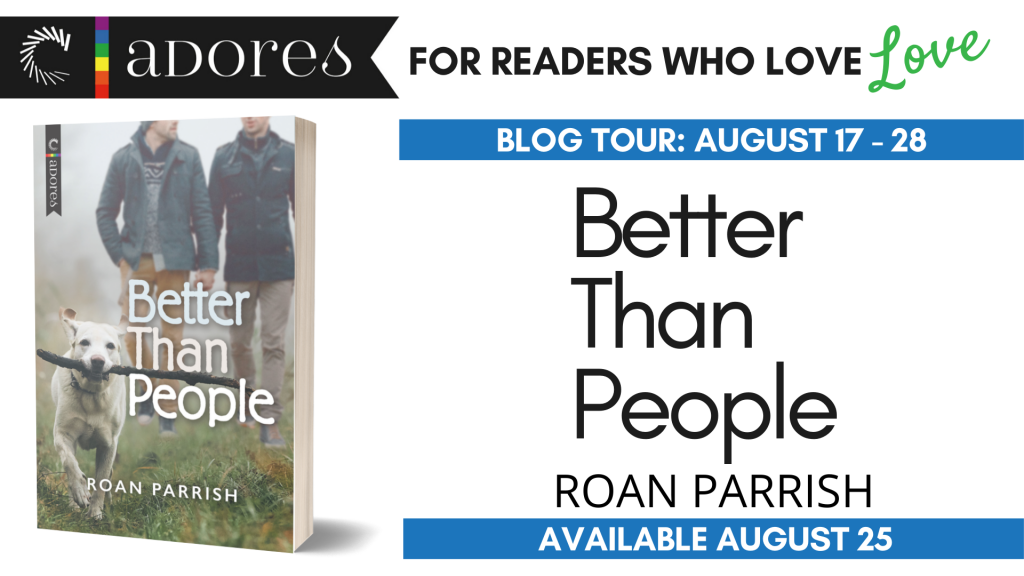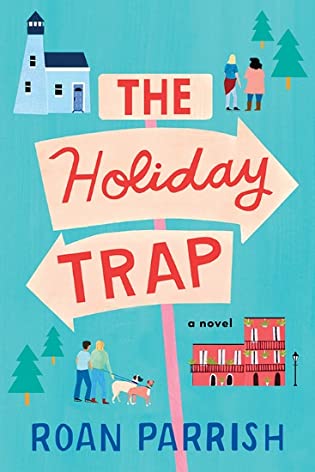 The Holiday Trap by Roan Parrish
The Holiday Trap by Roan Parrish Format: eARC
Source: supplied by publisher via Edelweiss
Formats available: paperback, ebook, audiobook
Genres: F/F romance, Hanukkah romance, holiday romance, M/M romance, romantic comedy
Pages: 312
Published by Sourcebooks Casablanca on September 6, 2022
Purchasing Info: Author's Website, Publisher's Website, Amazon, Barnes & Noble, Kobo, Bookshop.org, Better World Books
Goodreads
For fans of Alexandria Bellefleur and Alexis Hall comes a charming, hilarious, and heartwarming LGBTQIA+ romcom about two separate couples finding love over the holidays from acclaimed author Roan Parrish!
Greta Russakoff loves her tight-knit family and tiny Maine hometown, even if they don't always understand what it's like to be a lesbian living in such a small world. She desperately needs space to figure out who she is.
Truman Belvedere has just had his heart crushed into a million pieces when he learned that his boyfriend of almost a year has a secret life that includes a husband and a daughter. Reeling from this discovery, all he wants is a place to lick his wounds far, far away from New Orleans.
Enter Greta and Truman's mutual friend, Ramona, who facilitates a month-long house swap. Over the winter holidays, each of them will have a chance to try on a new life...and maybe fall in love with the perfect partner of their dreams. But all holidays must come to an end, and eventually Greta and Truman will have to decide whether the love they each found so far from home is worth fighting for.
My Review:
There’s a saying about “blooming where you’re planted”, but with the best will and the most love in the world, that’s not always possible. No matter how much a person may love their hometown or their family or their job or whatever is keeping them in place, the place may not be a great fit for them
And sometimes we need to be kicked out of our not-quite-comfy little pots before they become ruts. Or plots, as in “the only difference between a rut and a grave are the dimensions” kind of plots.
Both Greta Russakoff and Truman Belvedere each need a good, swift kick out of their always slightly squirmy but suddenly seriously uncomfortable pots. Which is where their mutual friend and regular sounding board Ramona comes in.
Greta needs to get away from her close-knit-to-the-point-of-codependency family on teeny, tiny, Owl Island, Maine. Truman needs a getaway from a spectacular failure of a relationship in New Orleans. Ramona suggests a house swap. For the entire month. Of December.
What happens to Greta and Truman is that both of their worlds expand once they transplant themselves. In New Orleans, Greta finds friends and community. She’s able to spread her wings in a place where she’s not literally the only lesbian in town, and where her every single act isn’t discussed ad infinitum, ad nauseum AND reported back to her parents and sisters. She loves them all but finds the extreme insularity of the town and especially her family a strait-jacket.
In New Orleans she can breathe. She can be herself without everyone around her trying to lovingly push her to conform – at least on the outside. And there’s someone she can fall in love with in a place that warms her heart and soul.
Truman is a fish out of water, but a fish that is more than willing to try living on land once he thaws out and gets some warmer clothes. Now that he’s out of his comfort zone, he’s willing to see if he can fit into this new place. And discovers that the townspeople, as curious as they are about Greta’s temporary guest, are more than willing to let him warm himself in their friendship.
Especially Ash, a local boy who managed to leave, but got sucked back to Owl Island as an adult when his mother was diagnosed with dementia. Now Ash is juggling a failing florist shop, his mother’s declining health and the loss of her true self even as he’s with her – and a rapacious land developer who wants to buy the prime downtown real estate where his shop is located. Ash doesn’t have nearly enough spoons to start a relationship with a man who’ll be leaving in a month.
But he does it anyway – then breaks both of their hearts when he can’t cope.
Before the month’s even half over, Greta knows she wants to stay in New Orleans, not just because of her new love, but because it’s where she belongs. She’s a hothouse varietal just like the carnivorous plants she desperately tries to keep alive on Owl Island – a climate for which neither they, nor she, are suited.
Truman wants to stay in Maine, with Ash, in this quirky little town that has healed his heart and shown him that he has more to give than just his overdeveloped sense of order.
All Greta has to do is deal with her smothering family. All Truman has to do is convince Ash that he doesn’t have to let himself be smothered by his responsibilities. That help – and love – are eagerly waiting for him to just let them in. Before their lives take them in directions that all of them will regret. Forever.
Escape Rating A: Part of what makes The Holiday Trap such a fun read is that it is a holiday romance that doesn’t center on the holidays at all. That the holiday that gets more emphasis in this holiday romance is Hanukkah and not Xmas was absolutely the flame that lights all the menorah candles in this story.
But the way the holiday was treated encapsulated the whole point of the story. Because it’s not the holiday, it’s that the tribe gathers for the holiday and the traditions that surround that gathering.
The Russakoffs are the only Jewish family on Owl Island. For her family it has become important to celebrate the holidays with the whole community while at the same time cleaving unto themselves as a tight tribe of their own. Which leads straight into the issues that cause Greta to practically flee into the night.
Because no one in Greta’s family is ever supposed to say what they really want or need. They have been coerced by longstanding tradition to always seek a compromise and to suffer in silence if their needs don’t get considered. It’s all out of love, it’s all done with the best intentions, and the tradition did begin with some excellent reasons as they are a family of six – mom, dad and four daughters – and during the early years there just wasn’t quite enough to go around. Nobody went hungry, no one went without any necessities, but treats, toys and outings all had to be shared, so what got bought or eaten or done was the thing that displeased the least amount of people rather than what was actually desired by anyone.
It’s good for children to learn to compromise, it’s good for all humans and we need a little more of it in the world. But it can easily reach a point where, instead of everyone saying what they do want and meeting in the middle, everyone starts asking for what they think everyone else wants or will accept. It’s can work if everyone accepts that’s the way it works, but if the family brings in an outsider – like a son or daughter in law – or if one of the children leaves the cozy nest and is in a place where they have to stand up for themselves, or if one or more of the grown children is just too different to compromise their entire self all the time in order to get along and not rock the boat, you get the situation Greta finds herself in, where as much as her parents and sisters love her they keep trying to push her to fit into the family codependency and she just can’t. And won’t. And shouldn’t have to.
Truman’s situation is more self-inflicted. He’s both broken-hearted and completely embarrassed and kicking himself from New Orleans to anywhere he can take himself off to because he’s spent a year in a relationship with a douchebag and ignoring all the many, many, red flags that should have told him that he was someone’s dirty secret and not remotely the love of their life. Because they already have one of those and Truman is not it.
I liked Truman’s story, and it made a very nice foil for Greta’s, but I LOVED Greta’s story. It’s not just that she’s Jewish, although that certainly helped because there aren’t nearly enough Hanukkah romances in this world. But when Greta takes herself away from home, she goes to one of the most fascinating cities in the U.S. if not the world and makes a place for herself in it. I’m a sucker for stories set in New Orleans and Greta’s discovery of the city and herself captured me from the very first page.
That Greta’s family strongly resembles one I very nearly became a part of and gave her side of this house swap a whole lot of extra resonance that I wasn’t expecting. At all. But it helped me understand so much of where she was coming from because everyone means so very well, they have so much the best intentions and can be so, so good at laying on the guilt when someone doesn’t conform.
To make a much longer story than I intended a bit short, The Holiday Trap is an excellent holiday romance that puts its emphasis on the romance and the relationships that surround a romance and make a village – big or small – without getting into the religious aspects of any holiday. This could have been set at Thanksgiving and it still would have worked – it just wouldn’t have been nearly long enough.
But speaking of things that were not quite enough, the one person we don’t get nearly enough of is Ramona the almost magical matchmaker. I’d love to see more of her talents in a future story!

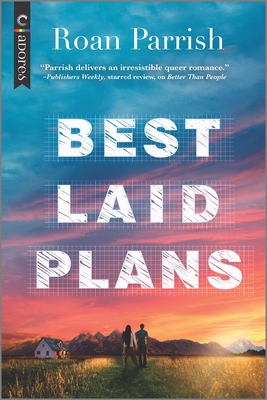 Best Laid Plans (Garnet Run, #2) by
Best Laid Plans (Garnet Run, #2) by 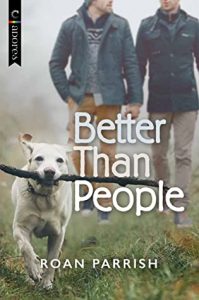 Charlie Matheson has done nothing but live his life according to a self-imposed plan since the day his parents were killed in a car accident, leaving the just barely 18-year-old Charlie with a decent house, a failing hardware store, and the custody of his then 13-year-old brother Jack. (Jack is the protagonist of
Charlie Matheson has done nothing but live his life according to a self-imposed plan since the day his parents were killed in a car accident, leaving the just barely 18-year-old Charlie with a decent house, a failing hardware store, and the custody of his then 13-year-old brother Jack. (Jack is the protagonist of 
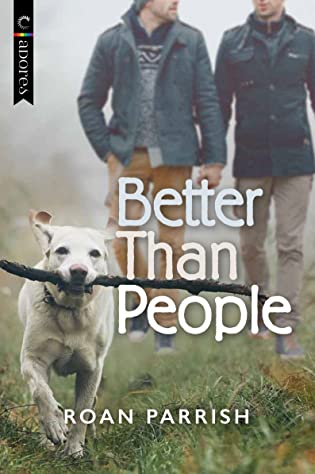 Better Than People by
Better Than People by 